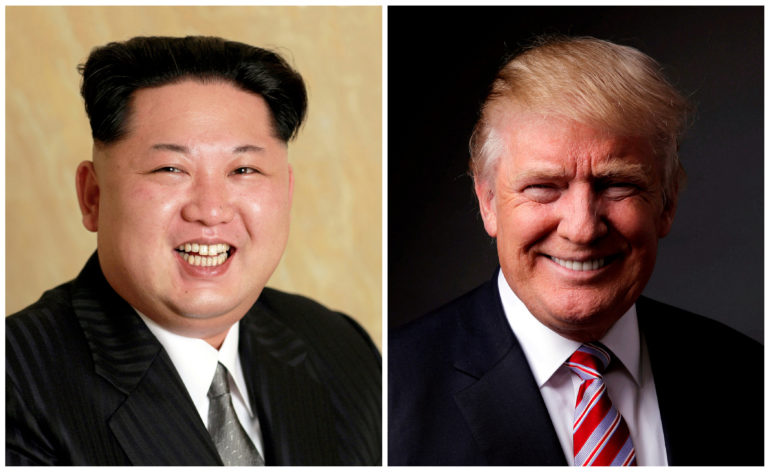
A combination photo shows a Korean Central News Agency (KCNA) handout of Kim Jong Un released on May 10, 2016, and Donald Trump posing for a photo in New York City, U.S., May 17, 2016. (REUTERS/KCNA handout)(REUTERS/Lucas Jackson/File Photo)
Son Ha Tran
North Korea has accused Washington of provocation and has threatened to pull out from the U.S.-North Korea summit.
The summit, which is planned for June 12, was set up to discuss “a complete denuclearization and peace settlement on the Korean Peninsula”.
But the upcoming meeting is on the verge of collapse according to Pyongyang’s latest response to remarks by White House National Security Adviser John Bolton.
North Korean Deputy Foreign Minister Kim Kye-gwan replied to Bolton’s statements on denuclearization, saying they would not improve U.S-North Korea relations.
The response came hours after North Korea announced plans to cancel high-level inter-Korean talks over the joint military exercises between the U.S. and South Korea.
These annual military drills are often criticized by Pyongyang and North Korea consider the drills “provocation”, according to North Korea’s state-run Central News Agency.
“This is not an expression of intention to address the issue through dialogue,” Kim said. “It is essentially a manifestation of an awfully sinister move to impose on our dignified state the destiny of Libya or Iraq,”
He said his country did not appreciate being compared to Libya by Bolton and said they would not yield to big powers like the US, as Libya and Iraq have done in the past.
“The world knows too well that our country is neither Libya nor Iraq, which have met a miserable fate,” Kim said.
He criticized Bolton personally and warned the Trump administration that he had a “feeling of repugnance towards him”.
Kim said Pyongyang is offended by being compared to Libya which only had been at the initial stage of nuclear development, unlike North Korea, which is “a nuclear weapon state”.
He said if President Donald Trump’s policy did not differ from his predecessors’, then Pyongyang would reconsider the dialogue of disarmament and also the upcoming summit in June.
“If the U.S. is trying to drive us into a corner to force our unilateral nuclear abandonment, we will no longer be interested in such dialogue and cannot but reconsider our proceeding to the DPRK-U.S. summit,” Kim said. (DPRK is an acronym for North Korea’s official name, the Democratic People’s Republic of Korea.)
Marius Grinius, a fellow at the Canadian Global Affairs Institute and a former ambassador to both North and South Korea, said the unpredictable and uncertain pattern of North Korea’s foreign policy is not new and is expected to be continued.

South Korean President Moon Jae-in and North Korean leader Kim Jong Un attend a banquet on the Peace House at the truce village of Panmunjom inside the demilitarized zone separating the two Koreas, South Korea, April 27, 2018. Korea Summit (Press Pool/Pool via Reuters).
“The (joint military) exercise is a perfect example of that,” Grinius said. “It’s a surprise that something has been planned, which North Korea has been noted about, would cause them to cancel the senior meeting.”
James Trottier, a fellow at the Canadian Global Affairs Institute and a former career Canadian diplomat with experience in North and South Korea, said the move by Pyongyang has shown their strategy very clearly in dealing with the Inter-Korean affair.
“This is right from the North Korea’s playbook, a sudden shift in different directions, is the usual tactic to keep the opponent off balanced,” Trottier said. “You can see that, it’s one-two punch, the first one was the cancelation of the inter-Korean summit, and the second one was the reconsidering the U.S.-North Korea summit.”
Trottier said Kim is taking advantage of the fact that President Trump has been promoting the summit and the potential results of denuclearization.
“Kim is trying to take advantage of that leverage to change, at least, the tone of Americans,” Trottier said. “And what Trump has been saying about the complete denuclearization is completely unrealistic.”
“That is the irony because, Trump is setting himself up for the failure of the summit, that he will not get any denuclearization,” he said.
“These North Korea’s behaviours have happened in the past, there’s a long history of North Koreans doing something and backing out,” Grinius said. “But there are a couple of other factors out there could affect their intentions.”
Grinius said the differences between the U.S. and North Korea on how to define denuclearization and disarmament might cause hurdles along the way to achieve a final consensus.
“It is a public relations game with all the tricks North Korea has been playing,” Grinius said. “They have been very demanding, for food, oil, and energy, especially when president Moon Jae-in who favours in engaging with the North is in charge.”
“You don’t have to be skeptical to believe that Kim Jong Un will never give up his nuclear weapons,” He said. “All of these positive elements could come to none.”

